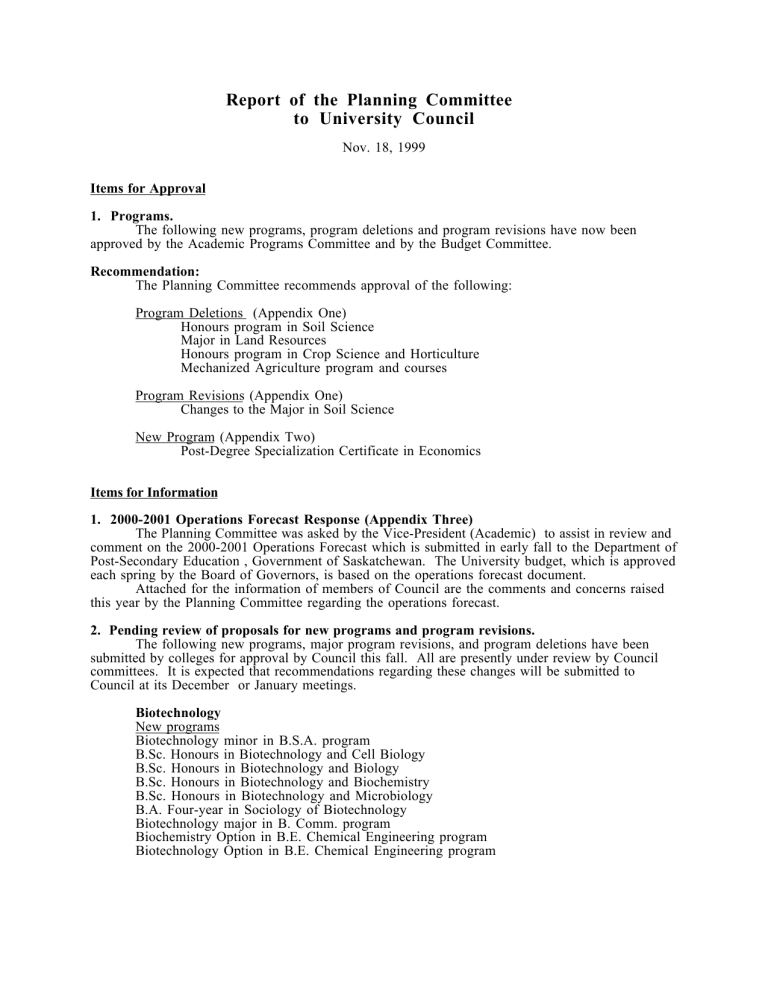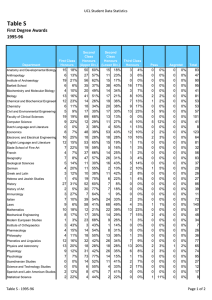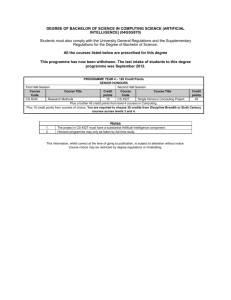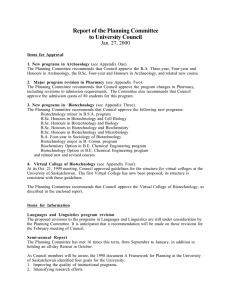Report of the Planning Committee to University Council

Report of the Planning Committee to University Council
Nov. 18, 1999
Items for Approval
1. Programs.
The following new programs, program deletions and program revisions have now been approved by the Academic Programs Committee and by the Budget Committee.
Recommendation:
The Planning Committee recommends approval of the following:
Program Deletions (Appendix One)
Honours program in Soil Science
Major in Land Resources
Honours program in Crop Science and Horticulture
Mechanized Agriculture program and courses
Program Revisions (Appendix One)
Changes to the Major in Soil Science
New Program (Appendix Two)
Post-Degree Specialization Certificate in Economics
Items for Information
1. 2000-2001 Operations Forecast Response (Appendix Three)
The Planning Committee was asked by the Vice-President (Academic) to assist in review and comment on the 2000-2001 Operations Forecast which is submitted in early fall to the Department of
Post-Secondary Education , Government of Saskatchewan. The University budget, which is approved each spring by the Board of Governors, is based on the operations forecast document.
Attached for the information of members of Council are the comments and concerns raised this year by the Planning Committee regarding the operations forecast.
2. Pending review of proposals for new programs and program revisions.
The following new programs, major program revisions, and program deletions have been submitted by colleges for approval by Council this fall. All are presently under review by Council committees. It is expected that recommendations regarding these changes will be submitted to
Council at its December or January meetings.
Biotechnology
New programs
Biotechnology minor in B.S.A. program
B.Sc. Honours in Biotechnology and Cell Biology
B.Sc. Honours in Biotechnology and Biology
B.Sc. Honours in Biotechnology and Biochemistry
B.Sc. Honours in Biotechnology and Microbiology
B.A. Four-year in Sociology of Biotechnology
Biotechnology major in B. Comm. program
Biochemistry Option in B.E. Chemical Engineering program
Biotechnology Option in B.E. Chemical Engineering program
2 Planning Committee Report
Nov. 18, 1999
College of Arts and Science
New Programs
Minor in Statistics (and related changes to the Mathematics program)
Minor in Chemistry
Bachelor of Science in Archaeology
Bachelor of Arts in Archaeology
Languages and Linguistics (major revision covers new programs including Minor in French, program revisions, program deletions)
Program Revisions
Changes to the Chemistry major and Honours programs
Changes to the Physics major and Honours programs
Changes to Psychology major and Honours programs
Changes to Anatomy major and Honours programs
College of Pharmacy and Nutrition
Changes to Pharmacy program
College of Law
Changes to first-year Law program
3. Resignations.
The Committee accepted with regret the resignations of Dean Franco Berruti and Professor
Jim McClements, due to pressure of other work. The Nominations Committee will be recommending new members.
_______________________________________
Jene Porter, Chair
Committee members:
R.P. MacKinnon, President
M. Atkinson, Vice-President (Academic)
A.J. Whitworth, Vice-President (Finance and Administration_
M. Corcoran, Vice-President (Research)
S. Junor (USSU)
S. Pinder (GSA)
R. Thompson (Sessional Lecturer)
R.E. Bilson
H. Dickinson
G. Khachatourians
L. Qualtiere
W.W.E. Slights
E.B. Waygood
H. Wood
B.L. Dubray, University Studies Group
P.M. Melis, Office of the Vice-President (Academic)
C. Fornssler, Committee Coordinator
Planning Committee of Council
Nov. 18, 1999
Appendix One:
Program Deletions and Revisions, College of Agriculture
RECOMMENDATION
To:
Date:
University Council
Nov. 18, 1999
Re: College of Agriculture – Deletion of the Mechanized Agriculture program
Summary of proposal:
The Mechanized Agriculture major program is being deleted (see page 36 of the 1999-2000
Calendar) including deletion of 12 courses. The course deletions will be staged to accommodate the needs of students now in the program. Four courses will be revised and will remain.
Rationale:
The program is being deleted because of low demand by students and the problem of having to offer too many courses for a small number of students.
Impact and Relationships:
None.
Additional resources required:
None
Committee Comments and Recommendation
Academic Programs Committee:
The Academic Programs Committee questioned the college about how students already in the program would be accommodated. The College replied that courses would continue to be offered so that students presently in the program could complete it.
The Academic Programs Committee recommends deletion of the Mechanized Agriculture program effective immediately. Students previously admitted to the program will be accommodated to complete the program.
Budget Committee:
The Budget Committee recommends approval of this deletion.
Planning Committee:
The Planning Committee recommends approval of this deletion.
Attached: Submission of May 12, 1999 cc: College of Agriculture
RECOMMENDATION
To:
Date:
University Council
Nov. 18, 1999
Re: College of Agriculture – Deletion of the Honours Soil Science program and Major in Land Resources; revision of the Major in Soil Science
Summary of proposal:
The Department of Soil Science, College of Agriculture, is deleting its Honours program in Soil
Science and its Major program in Land Resources; the Major program in Soil Science is being revised to allow students more electives, so that they can complete a Minor (see page 36 of the 1999-
2000 Calendar).
Rationale:
The Honours program in Soil Science is not sufficiently distinct from the Majors program to warrant continuation. The Major program in Land Resources is too similar to the Environmental Earth
Science program in Arts and Science and the Environmental Sciences major in Agriculture. The Soil
Science major is being revised to increase the number of elective credit units, which will allow students to complete a minor as well.
Impact and Relationships:
No impact on other departments or colleges.
Additional resources required:
None.
Committee Comments and Recommendation
Academic Programs Committee:
The Academic Programs Committee questioned the college about how students already in the program would be accommodated. The College replied that only one or two students were presently enrolled in either program. They were also asked why BIOCH 200 has been added as an alternate to
CHEM 231. The College replied that students will have sufficient chemistry with the biochemistry course, and can also use this course toward the proposed Biotechnology minor.
The Academic Programs Committee recommends deletion of the Honours program in Soil Science and deletion of the Major in Land Resources, effective immediately. Students interested in the program will be counseled to take a soil science major.
The Academic Programs Committee also recommends approval of the revisions to the Major in Soil
Science as described in the proposal of April 23, 1999.
Budget Committee:
The Budget Committee recommends approval of this deletion and program revision.
Planning Committee:
The Planning Committee recommends approval of this deletion and program revision.
Attached: Submission of April 21, 1999 cc: College of Agriculture
RECOMMENDATION
To:
Date:
University Council
Nov. 18, 1999
Re: College of Agriculture – Deletion of the Honours Crop Science and Horticulture program
Summary of proposal:
Discontinuation of the B.S.A. Honours program in Crop Science and Horticulture (see page 36 of
1999-2000 Calendar)
Rationale:
The Honours program is not sufficiently distinct from the majors program to warrant continuation as a separate program.
Impact and Relationships:
None.
Additional resources required:
None.
Committee Comments and Recommendation
Academic Programs Committee:
The Academic Programs Committee questioned the college about how students already in the program would be accommodated. The College replied that students already in the Honours program could continue to finish the program.
The Committee approved the following motion:
That the Honours program in Crop Science and Horticulture be deleted effective July 1,
2000. Students admitted to years two, three or four of the program prior to that date will be accommodated to complete the program
Budget Committee:
The Budget Committee recommends approval of this deletion.
Planning Committee:
The Planning Committee recommends approval of this deletion
Attached: Submission of May 14, 1999 cc: College of Agriculture
Planning Committee of Council
Nov. 18, 1999
Appendix Two:
Post-Degree Specialization Certificate in Economics, College of Arts and Science
RECOMMENDATION
To:
Date:
University Council
Nov, 18, 1999
Re: College of Arts and Science – Post-Degree Specialization Certificate in Economics
Summary of proposal:
To be eligible for a PDSC in Economics, a student must have successfully completed a University degree in some other discipline and area.
Students who have completed a B.A. degree are not eligible for the PDSC program. Such students may complete an Advanced Certificate in Economics.
Program requirements: at least 30 credit units of Arts and Science courses in addition to any courses required for the previous degree. The student must meet the major requirements for the Four-year degree in Economics, and meet the graduation standard in the major. The course requirements are:
1) Completion of ECON 111.3, 114.3, 204.6, 211.3 or 213.3, 214.3.
2) 12 credit units in Economics at the 300- or 400-level
3) 6 additional credit units in Economics.
A junior course in calculus is prerequisite for all 300-level courses in Economics. Students with alternate selections of mathematics and statistics courses from their previous degree are urged to consult with the department and the college regarding possible equivalencies.
Rationale:
The purpose of this program is to allow students with backgrounds in areas other than Economics to achieve competency and credit for an additional one year of study in Economics.
Two groups of students will benefit from this program:
1) Prior to the revision of the curriculum in Arts and Science in 1997, students with a B.Sc. degree in
Computer Science or Mathematics could complete an Advanced Certificate in Economics with completion of 30 additional credit units. The curriculum change meant that students with a B.Sc.
Three-year could obtain additional certification in Economics only by completing a B.A. Four-year degree, which requires 60 additional credit units. The PDSC proposal would allow such students to receive certification for study equivalent to the depth of a four-year degree, but in one year of additional study.
2) As well, the changes in the Commerce curriculum reduced the amount of Economics in that major. The PDSC would allow Commerce graduates to gain further knowledge in Economics equivalent to the depth of a four-year degree, but in one additional year of study.
Students from other colleges, such as Engineering or Education, may also wish to further their study in Economics.
Impact and Relationships:
No other program is affected by this proposal. The department consulted with the College of
Commerce and with other departments in Arts and Science.
Additional resources required:
None.
Committee Comments and Recommendations:
Academic Programs Committee:
The Academic Programs Committee recommends that the PDSC program in Economics be approved.
Budget Committee:
The Budget Committee recommends that the PDSC program in Economics be approved.
Planning Committee:
The Planning Committee recommends that the PDSC program in Economics be approved.
The Planning Committee also noted that both PDSC programs (Computer Science, and Economics) follow guidelines established by the college. It recommended that the college should consider requesting that Council approve the guidelines and delegate approval authority for specific PDSC programs to the college.
Attached: Submission of Jan. 22, 1999.
cc: College of Arts and Science
Planning Committee of Council
Nov. 18, 1999
Appendix Three:
2000-2001 Operations Forecast Response
TO:
FROM:
MEMORANDUM
Peter MacKinnon, President
Jene Porter, chair
Planning Committee of Council
DATE:
RE:
Nov. 4, 1999
Planning Committee comments on Operations Forecast
The Planning Committee of Council appreciates being given the opportunity again this year to provide input in the preparation of the University’s 2000-2001 Operations Forecast.
The Planning Committee’s first opportunity to comment on the University’s Operations
Forecast came in the summer of 1998, when the Office of the Vice-President (Academic) was preparing the 1999-2000 Forecast. This experience was an extremely positive one. It was gratifying for committee members to see, in the final version of the forecast and then later in the budget approved by the Board of Governors, how many of the priorities identified by the committee were supported by the President and were incorporated into the budget. It was also very satisfying for faculty to make such a visible and significant contribution to the future advancement of the University of Saskatchewan. Such involvement demonstrates the usefulness of collegial processes and the value of committee service. As faculty members have had to do more and more with less and less, finding individual faculty willing to devote their time and effort to administrative work on college and University committees has been increasingly difficult. The contributions made by Council committee members to last year’s Operations Forecast demonstrates that such work is truly worth doing.
This year the Vice-President (Academic) again requested the Planning Committee and the
Budget Committee to review the Operations Forecast submissions from the other Council committees:
Academic Programs Committee
Audio-Visual Committee
Extension and Public Service Committee
Information Technology Committee
Instructional Development Committee
Research Committee
Vice-President (Academic) Atkinson also sent to both the Planning Committee and the
Budget Committees all of the submissions from colleges and administrative units. The Planning
Committee welcomed this initiative. Seeing the requests from colleges and units helps committee members to form a more complete picture of budget requests, to determine how Council committee requests can fit into this picture, to note any duplications or gaps, and to make recommendations about goals, priorities and strategies.
The Planning Committee also established a Subcommittee including representatives from the Budget Committee to discuss areas of concern. The Joint Planning/Budget Subcommittee met to review each committee’s comments on submissions.
There have been several iterations of the Operations Forecast document: a preliminary discussion was held by the government and the administration on September 15 th
; a written brief
was given to the government by the administration on October 6 th ; a draft copy of the Operations
Forecast was given to the Council of Deans on (date); the joint Planning/Budget subcommittee received a draft on October 18 th and this was also provided to the Planning Committee on the 19 th .
A final revision was presented on October 26 th . An earlier version of this letter was made available for the final revision.
In the committee’s July 9, 1998 letter to President Ivany which discussed the Operations
Forecast, Professor Steer wrote that the Planning Committee views the Operations Forecast as a short- to medium-term operational planning document which should reflect the academic priorities of the University. Our position has not altered this year for Operations Forecast 2000-2001.
The University’s A Framework for Planning states four goals which will shape University priorities for the next decade:
Improving the quality of instructional programs.
Intensifying research efforts.
Fostering the teacher-scholar model.
Responding to the needs of Aboriginal peoples.
The Planning Committee has adopted as its priority the development of strategies to implement goals on this list. It assessed the Council committee submissions from the perspective of how the requested funding would contribute toward achieving these goals. In its discussions about the specific requests and its meeting with Budget Committee representatives, some broader concerns were also identified.
In the context of requesting budget increases, it may be useful to point out the connection between research and the undergraduate educational experience. Two excerpts from the Boyer
Commission report are particularly relevant in making this connection:
The Boyer Commission on Educating Undergraduates
REINVENTING UNDERGRADUATE EDUCATION:
A Blueprint for America's Universities
Funded by the Carnegie Foundation for the Advancement of Teaching
SITE: http://notes.cc.sunysb.edu/Pres/boyer.nsf/webform/images/$File/boyer.txt
“ The university's essential and irreplaceable function has always been the exploration of knowledge. This report insists that the exploration must go on through the “teaching” function as well as the traditional “research function”. The reward structures of the modern research university need to reflect the synergy of teaching and research – and the essential reality of university life: that undergraduates are the university's economic lifeblood.”
“The ecology of the university depends on a deep and abiding understanding that the inquiry, investigation, and discovery are the heart of the enterprise, whether in funded research projects or in the undergraduate classrooms or graduate apprenticeships.
Everyone at a university should be a discoverer, a learner. That shared mission binds together all that happens on campus. The teaching responsibility of the university is to make all of its students participants in the mission. Those students must undergrid their engagement in research with strong “general” education that creates a unity with their peers, their professors and the rest of society.”
The Planning Committee believes that the goals in A Framework for Planning should be woven into the Operations Forecast document, These should be at the forefront of our justification of what we do. The Committee urged that all submissions – from colleges, administrative units, and Council committees – be reviewed based on the four University goals, and the relationship of the new funding requests to the operational budget be similarly reviewed. The Planning
Committee was impressed by the themes developed by the Budget Committee for its own review
of these submissions: maintaining the base; continuing commitments for renewal; nurturing innovations; preparing for the future.
It is our firm belief that the Operations Forecast document should reflect, as it did last year, the submissions made by the various units. We do not see how units can be asked to participate in a process when the end product will not reflect their efforts. It is, of course, understandable that the University would want to take advantage of any opportunity for new funds. But, the long term development of the University, as well as the morale of the University, can be harmed. Given the entirely positive experience of the preceding year, this would be regrettable.
Specific recommendations:
1) Some of the requests from committees, colleges and other units were confusing in their presentation and unclear in their goals. Some are wish-lists, rather than plans. Some do not indicate any priorities for funding and seem to be presented as “all or nothing”. The Planning
Committee believes it would be useful for the Vice-President (Academic) to issue some additional guidelines describing the kind of document that is expected and how it should be presented.
2) The goals in A Framework for Planning should be listed and incorporated into the document; in particular quality of education, teacher-scholar model, and research intensiveness should be stressed more. These should be at the forefront of our justifications both of what we do and the initiatives we propose. The penultimate version of the Operations Forecast document, at least by implication, primarily justified through references to the economic health and future of the province.
3) The document should show how the university as a whole would benefit from the expenditures proposed. There needs to be more emphasis on the improvements to learning and improvements to the quality of student experience for all students.
4) We applaud the initiatives with respect to our Aboriginal students. We still find ourselves awaiting a full University response. It may be time to approach the government with something like the SCALAR (Saskatchewan Centre for Aboriginal Learning and Research) proposal and properly fund the program.
5) It is not clear if a tuition increase is being predicted in the report and how much this increase might be The student member of the Planning Committee noted that students will be very upset if tuition increases by that amount, even if fees are rolled into this. It was noted that tuition increases were reduced last year due to the millennium scholarship transfer, and the Committee questioned whether planning on such a transfer this year was advisable.
6) Regarding the “Access” fund, the Committee discussed whether the university should allow or encourage program-specific funding (sometimes called “strategic” or “directed” or “targeted” funding) from government. Whereas such targeted funding might provide support not otherwise available for needy and underfunded programs, relying on such funding for operational expenditures can be problematic, both in terms of long-term program commitments to students, and in terms of maintaining university independence in its academic programs and research programs.
In particular, the Planning Committee’s recommendations on IT are constrained by the fact that the
IT committee is in the process of completing a report and by the fact that the Budget Committee is presently trying to coordinate the four separate submissions on IT made by units on campus.
Since this is a subject which resonates with politicians and bureaucrats, there is the understandable temptation to seek funding if there is an opportunity. We believe that the effect on the whole university – assuming that this can be in fact demonstrated – needs to be shown and that the contribution to the planning goals needs to be indicated. It would be advisable, otherwise, to state
that this is simply an opportunity rather than to rationalize and to risk distorting the University’s goals and autonomy.
7) Regarding the goal of increasing research intensiveness, the Committee discussed whether the expenditures identified were the most appropriate and effective strategy. However necessary, spending funds on administrative program support for research grant applications does not adequately address the problems facing the University. Time-release grants for research activity, including preparation of grant proposals, would resolve the problem of a lack of time to prepare research proposals. However, sessionals cannot be hired to replace some positions. For some departments to operate, funding would have to be provided for term appointments.
There are many areas – including CFI and CIHR initiatives – where faculty release time is critical in order for the University to be successful in the competitions.
It should be noted that an increase in graduate student support is the sine qua non for an increase in scientific research, but it does not directly benefit faculty research in the social sciences and humanities, except for parts of Psychology and Geography. Lack of time to do research is the most significant factor in the humanities, social sciences, and fine arts.
8) The teacher-scholar goal, which is a distinctive and critical feature of any major university, plays a negligible role in the document.
Thank you for the opportunity to comment.
_________________________________________________
Jene Porter, chair, Planning Committee of Council cc: Planning Committee members



